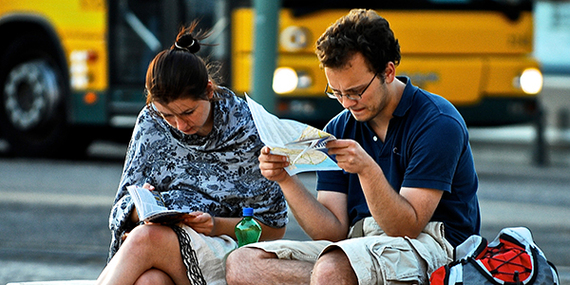The sharp decline in the stock price of travel agencies and carriers had impact not only on the major tour operators such as TUI and Thomas Cook, but also on the Royal Caribbean Cruises and Priceline, which are less prone to problems in southern Europe and northern Africa.
Perhaps this pessimism will not last long, because the global travel industry is recovering at lightning speed. First, the flow of tourists to Tunisia and Greece will fall, but their places will surely be filled with other destinations. For example, when in 2011 riots broke out at the Tahrir Square in Egypt, and filling of seaside resorts hotels decreased by almost 40%, the United Arab Emirates gathered in the harvest - hotel occupancy there grew by 8% for the year.
The statistics show that even places that recently had catastrophic events, begin to recover after the recession. According to consulting firm Deloitte’s data, published in the World Economic Forum’s report on the competitiveness of the travel and tourism industry in 2015, occupancy of hotels in New York City after the September 11 (2001) was restored in 34 months, while in the US market as a whole - in 45 months, although the situation there was aggravated due to the economic downturn. In comparison, Madrid restored in twelve months after the bombings on the railway, and London, after the terrorist attacks in July 2005, - in nine.
In 2013, two years after the accident at Fukushima, a record number of visitors came to - nine million people – came to Japan. Following the outbreak of SARS in Asia and the swine flu in Mexico, the numbers of filling hotels there recovered in just a year. Deloitte’s data indicate that even major terrorist attacks do not have a lasting impression on tourists.
Such resilience is partly a result of the efforts of tourist countries. When in Bali, Indonesia, the number of tourists had decreased after a series of bombings in 2005, the island took the sharp devaluation of the Indonesian currency and held a campaign under the slogan "Our losses is your gain!" Greece could have considered similar action if drachma was returned, which immediately would get depreciated. Tunisian tourist flows are also very sensitive to price fluctuations: if prices are low, tourists will not pay attention even to terrorist attacks.
The increasing availability of travel and improving the tourism industry transform our world into a product. Today, travel is much less adventure than 20 or even 10 years ago. This is convenient, because the population of rich countries providing the bulk of tourists is gradually aging. Older tourists are less interested in tickling their nerves with adventures; therefore, tourism industry makes stays in one country very similar to another especially for such a contingent. In many cases, vacationers are not even interested in what is happening in the country where they are going to go. When Bangkok in 2008 had series of coup d'etats, Thai resort islands even did not noticed reduction of tourist flow.
Such a separation is useful for the economy, yet not really good for the mind of tourists. We focus on the fact that the tourism industry is able to protect us from harsh reality. Nevertheless, other countries are not amusement parks. Sometimes this reality intervenes, and we are faced with it in all its brutality - from non-performing ATMs to shooting on the beaches.
source: bloomberg.com
Perhaps this pessimism will not last long, because the global travel industry is recovering at lightning speed. First, the flow of tourists to Tunisia and Greece will fall, but their places will surely be filled with other destinations. For example, when in 2011 riots broke out at the Tahrir Square in Egypt, and filling of seaside resorts hotels decreased by almost 40%, the United Arab Emirates gathered in the harvest - hotel occupancy there grew by 8% for the year.
The statistics show that even places that recently had catastrophic events, begin to recover after the recession. According to consulting firm Deloitte’s data, published in the World Economic Forum’s report on the competitiveness of the travel and tourism industry in 2015, occupancy of hotels in New York City after the September 11 (2001) was restored in 34 months, while in the US market as a whole - in 45 months, although the situation there was aggravated due to the economic downturn. In comparison, Madrid restored in twelve months after the bombings on the railway, and London, after the terrorist attacks in July 2005, - in nine.
In 2013, two years after the accident at Fukushima, a record number of visitors came to - nine million people – came to Japan. Following the outbreak of SARS in Asia and the swine flu in Mexico, the numbers of filling hotels there recovered in just a year. Deloitte’s data indicate that even major terrorist attacks do not have a lasting impression on tourists.
Such resilience is partly a result of the efforts of tourist countries. When in Bali, Indonesia, the number of tourists had decreased after a series of bombings in 2005, the island took the sharp devaluation of the Indonesian currency and held a campaign under the slogan "Our losses is your gain!" Greece could have considered similar action if drachma was returned, which immediately would get depreciated. Tunisian tourist flows are also very sensitive to price fluctuations: if prices are low, tourists will not pay attention even to terrorist attacks.
The increasing availability of travel and improving the tourism industry transform our world into a product. Today, travel is much less adventure than 20 or even 10 years ago. This is convenient, because the population of rich countries providing the bulk of tourists is gradually aging. Older tourists are less interested in tickling their nerves with adventures; therefore, tourism industry makes stays in one country very similar to another especially for such a contingent. In many cases, vacationers are not even interested in what is happening in the country where they are going to go. When Bangkok in 2008 had series of coup d'etats, Thai resort islands even did not noticed reduction of tourist flow.
Such a separation is useful for the economy, yet not really good for the mind of tourists. We focus on the fact that the tourism industry is able to protect us from harsh reality. Nevertheless, other countries are not amusement parks. Sometimes this reality intervenes, and we are faced with it in all its brutality - from non-performing ATMs to shooting on the beaches.
source: bloomberg.com



















